Big changes happen slowly at first, then all at once.
And there’s a BIG change coming to the way people will interact with your content.
I took a deep dive into this big, new trend in SEO. Here’s everything you need to know…
So what’s the big trend?
Voice search.
Experts from Google and Microsoft agree this will be one of the major innovations in the next 10 years.
But it’s already happening TODAY.
Which means, it’s time to position yourself to take advantage of it now.
In short: Voice search is here. And it’s getting bigger…
So big in fact, that recently the writers of South Park hilariously trolled thousands of Amazon Alexa owners.
How?
By deliberately activating their digital assistants: Don’t watch this if you’re easily offended.
Now… This is just one anecdote to illustrate the bigger trend:
More and more people are using their voice – instead of their keyboard – to search online.
So far, only SEO experts seem to be preparing. A recent survey showed that many marketers may SEE the trend… But they’re not doing anything about it…
That’s great news for you: You have an opportunity to get ahead of the curve.
I’m certainly planning to take advantage of this change here at Social Triggers. That’s why I took some time to look at exactly what’s happening – and how to prepare.
Now, I’m not super technical when it comes to SEO. So, don’t worry if you’re not either. I’ll break everything down in simple terms here.
Specifically, here’s what I’ll cover:
- What is voice search?
- Some fascinating stats about voice search (so you get an idea of how big this trend really is)
- How voice search will change the way we interact with content (the big picture)
- 5 important differences of voice search you should know
- What should you do to prepare right now?
I’ve collected everything here as a go-to resource. I’ll update this page as new info becomes available (so bookmark if you like).
So first, what is voice search?
What is Voice Search
On the surface, it’s pretty simple:
Voice search allows users to search by using their voice. So, instead of TYPING into a search field… people use their voice. Duh!
You’ve probably seen or used it on your computer, tablet or phone:
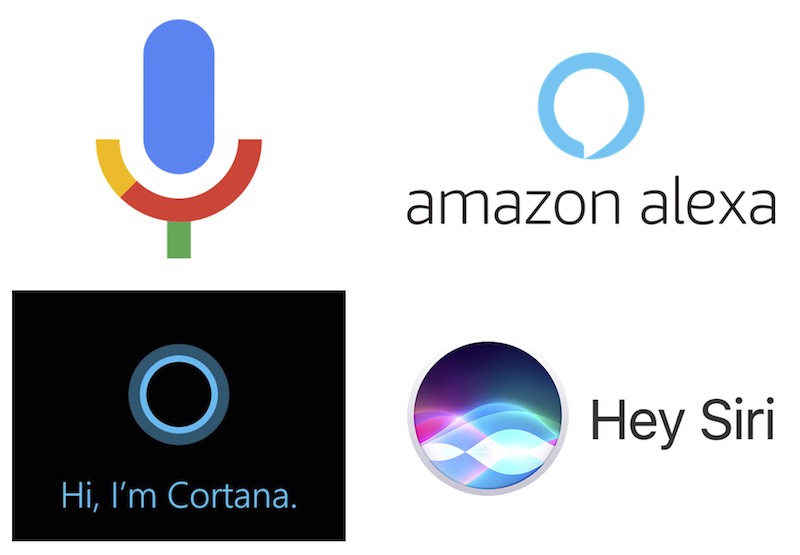
Voice search by Google, Amazon, Microsoft, and Apple
But what are the implications?
That’s where it gets more interesting…
You see, voice search also includes all kinds of digital assistants: Siri if you’re using an iPhone or Apple computer. Cortana if you’re on Windows (my condolences…). Plus, digital assistants at home, like Amazon’s Echo devices using Alexa.
When you combine all of these voice-guided tools, you’ll see that they’re starting to make up a sizeable portion of how we search online.
How big exactly is voice search? Let’s look at some numbers.
Voice search by the Numbers: The Trend is Real (And It’s Big)
I’m not going to bore you with lots of stats. I just want to show you this trend is real.
First, consider how many people ALREADY use voice search:
- 40% of adults use voice search at least once per day
- Google says 20% of all mobile searches are by voice.
- 3 months after Windows 10 launched, 33% of searches were coming from voice.
What’s even more impressive is how FAST this happened. Voice searches are up by a factor of 35 (!) from 2008-2016.
Second, there’s good reason to believe this exponential growth will continue:
- 65% of people who own Amazon Echo or Google Home can’t imagine going back.
- The Echo Dot was the best-selling product on all of Amazon in the 2018 holiday season.
- By 2020, 50% of all searches are expected to come from voice
So, yeah – the trend is real. And it’s big.
The question is: What’s driving this growth?
Well, there are at least 5 good reasons voice search is growing:
Reason #1 is that speech recognition is finally usable. The word error rate is as low as 8% now. As it gets even lower, voice search will grow even faster.
Reason #2 is simply that it’s easier. As cool as touchscreens are, speaking is easier than navigating tiny buttons on a screen – even if you’re using your fingers. But it’s not just easier. It’s also faster. So…
Reason #3, as Purna Virji points out, is speed. Most people type about 40 words per minute. But you can speak 110-150 words per minute. This makes voice search very attractive. Especially because people want quick answers.
Reason #4 is that people are often using multiple screens at once. Say, phone and laptop. Or TV and phone. So, using your voice while you type on the other devices makes a lot of sense.
Reason #5 – and this is important – is the ongoing growth of mobile searches. Mobile now makes up more than half of all traffic.
The connection to mobile searches is especially important for local businesses (meaning, you have a physical location). Why? Because most mobile searches are local-based. That is, searches that include “near me” or “close by.”
Now combine that with the fact that when people use voice search on their phone, it’s 3x as likely to be a local search.
So one thing’s clear: If you’re a business with a local presence taking advantage of voice search is going to be crucial.
But how?
Well, in order to prepare, it’s important to understand how voice search is different from text search. The differences may seem small… but they’re consequential.
I’ll talk about those differences in detail below. First, let’s look at the big picture. Why does voice search even matter?
The Big Picture: How Voice Search Changes The Way We Interact with Content
You’ve seen the numbers. People are talking to their devices. But there’s another shift happening.
People started using voice search at home alone… But now, they’re using it EVERYWHERE. You’ll notice the change when you look at this survey data:
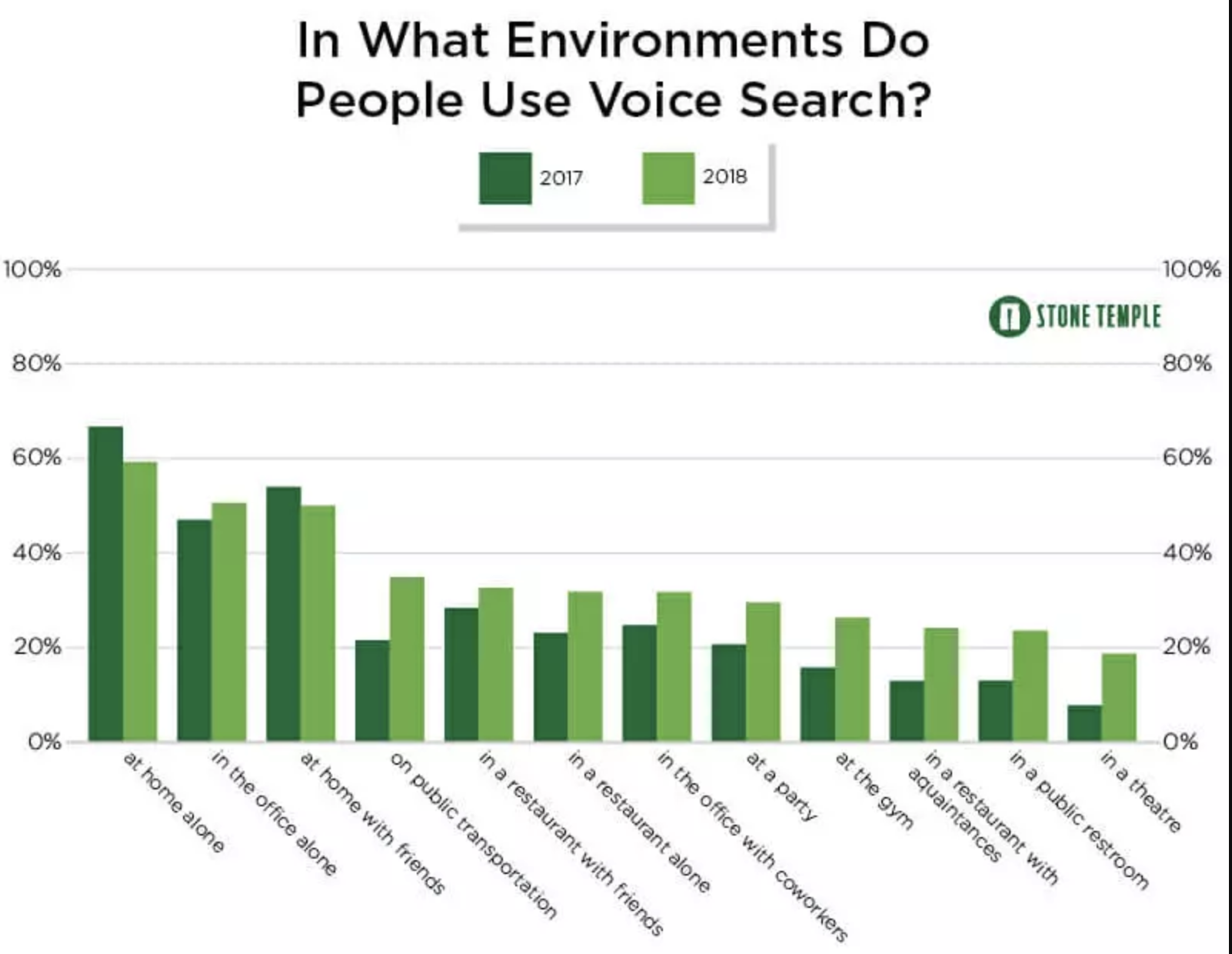
How do people use voice search?
A LOT more people are starting to use voice search when they’re say at a party, at the gym, or even in a theatre.
This shows: People are getting COMFORTABLE using their voice to control their tech-devices. At first, this change seems trivial…
So does it really matter?
We use keyboards. We use styluses (styli…). Now we use our voice. So what? Does it really matter if we type, tap, or… talk?
For example, why would you, as a website owner, need to know if people used their voice to search for your content? Even Google itself isn’t quite sure, as this discussion on Twitter shows:
I hear folks asking about voice search data in Search Console often. Can you elaborate on what you want to see there? What's an example of such a query that would be useful? pic.twitter.com/WOqS7aH4tP
— John ☆.o(≧▽≦)o.☆ (@JohnMu) December 7, 2017
However, I believe there are some important differences.
Things change when people actually start TALKING TO THEIR DEVICES!
First, let’s just consider the cool stuff you can do with your voice already…
Behshad Behzadi gave a great overview of what’s already possible in his 2016 keynote at SMX (Search Marketing Expo).
You can, of course, ask “questions about the world.” For example, I asked the Google microphone “When does the new season of Game of Thrones start?”

“Google, when does the new season of Game of Thrones start?”
Google answered my question AND read it back to me. Sweet!
Then I asked Siri the same thing. She struggled and couldn’t find the answer:
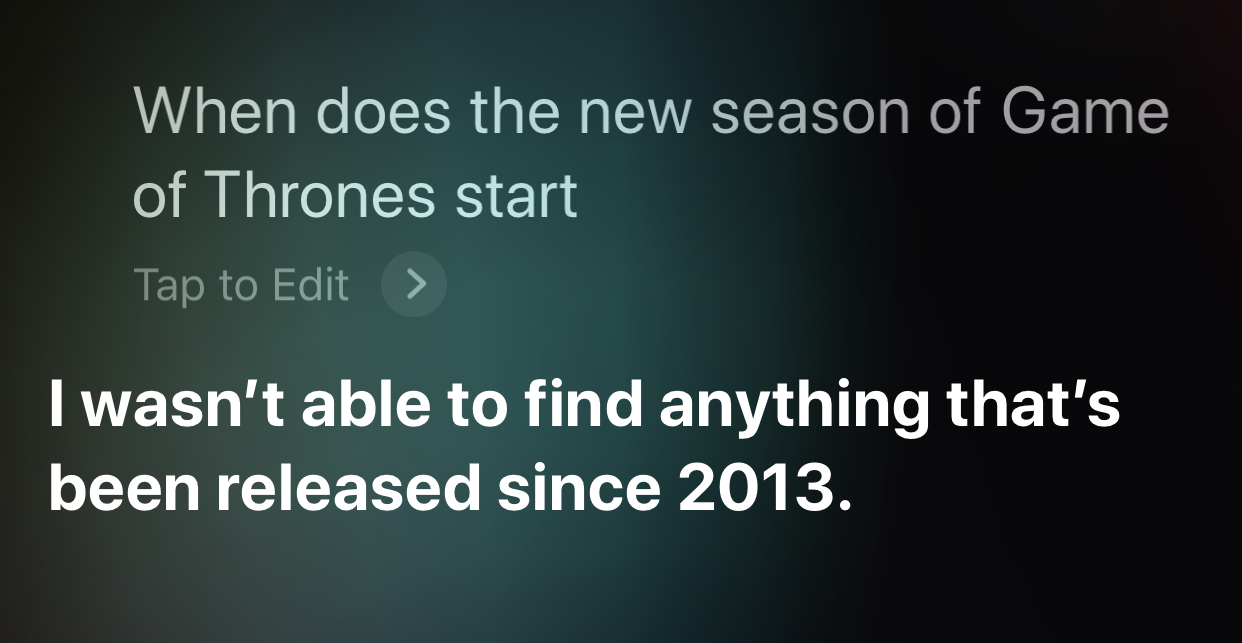
Get it together Siri…
Get it together Siri! Anyway…
As Behzadi points out, you can use voice search to ask questions about your “own world,” too. Say, “When’s my next appointment?” Your digital assistant will look through your email and calendar to pull up the right info.
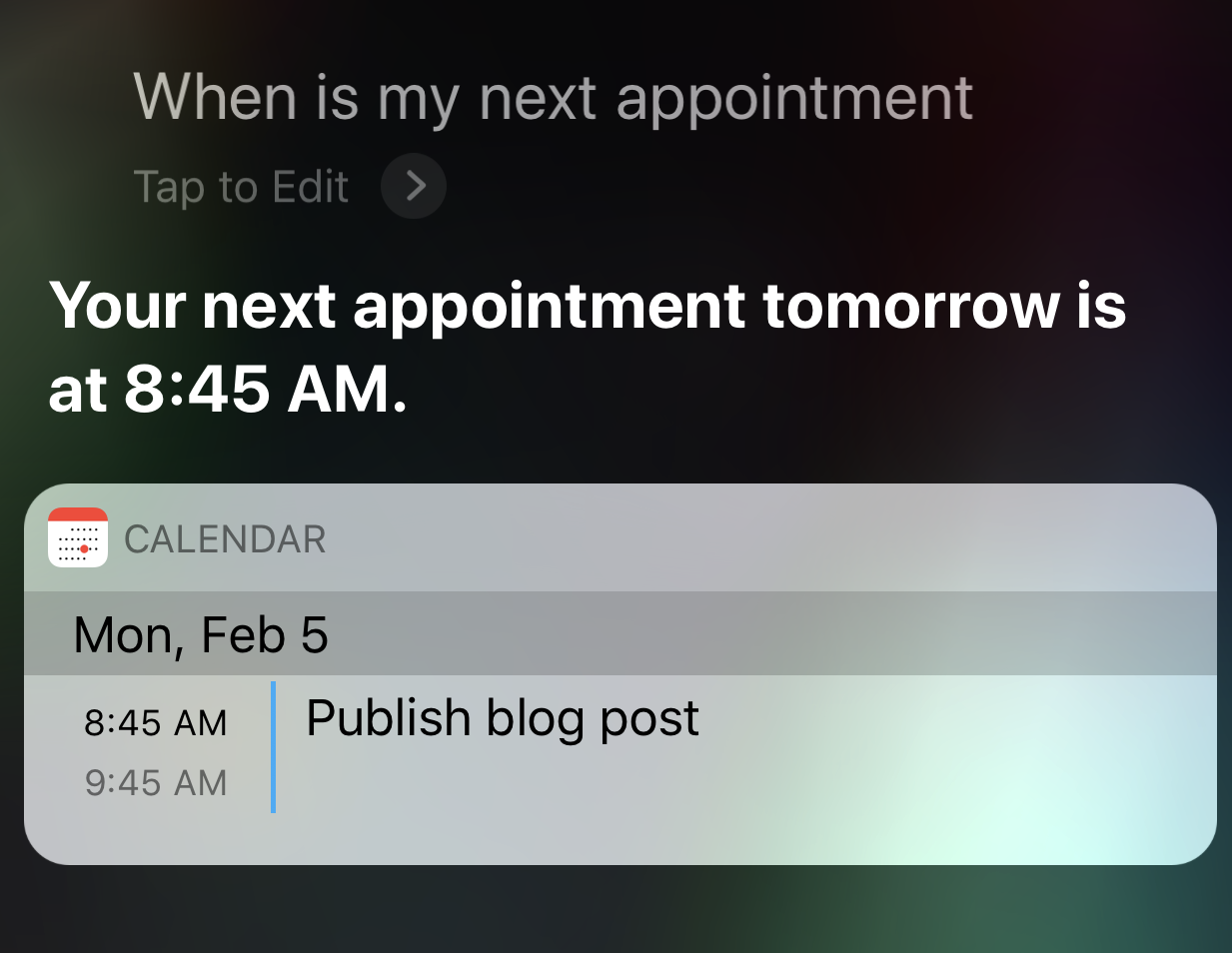
“Siri, when’s my next appointment?”
Siri, you got this! Here’s another cool voice command: You might ask a digital assistant to open an app. Like this…

“Open HBO NOW”
You can also use your voice for “actions.” For example, setting a reminder:
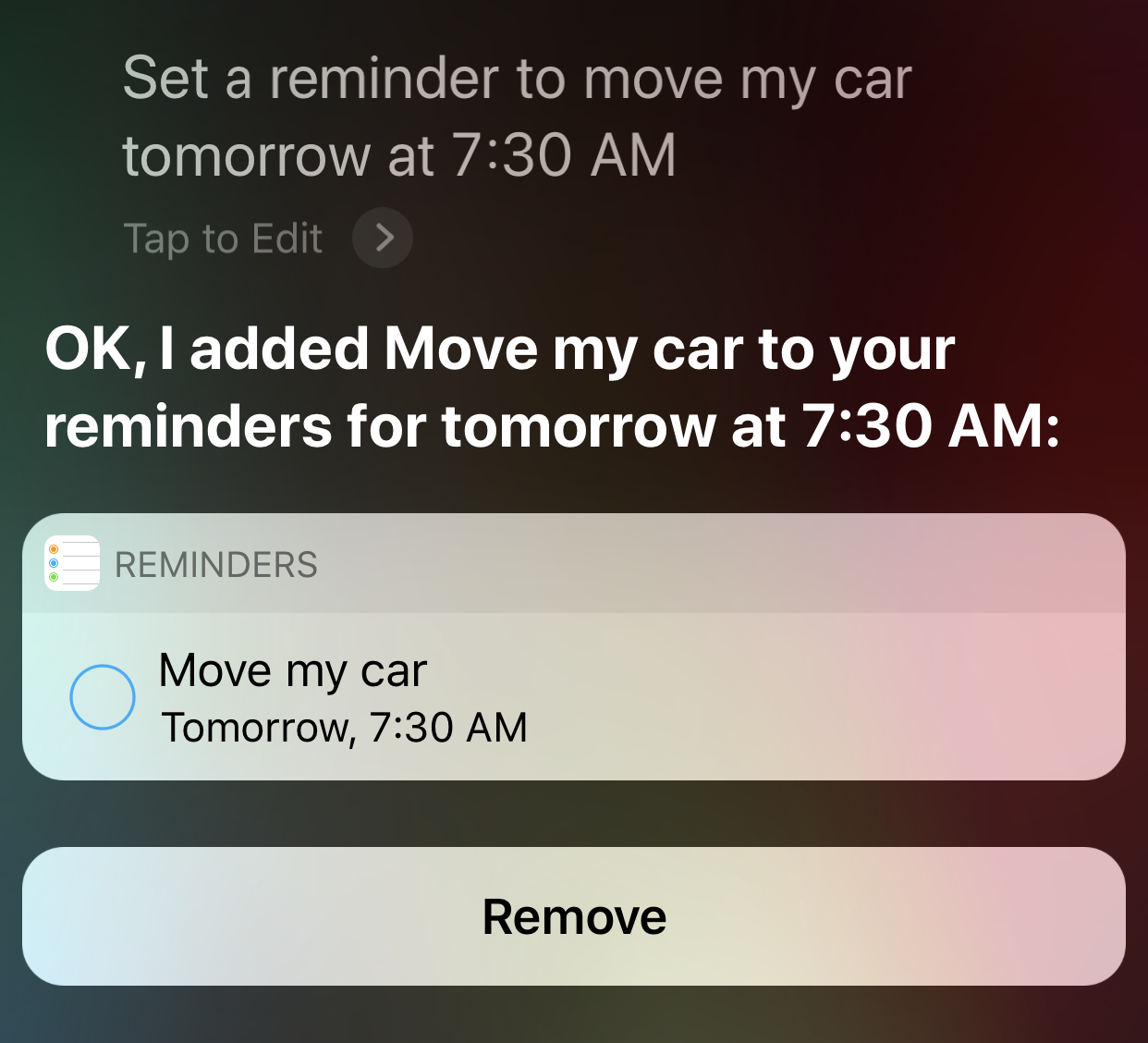
“Set a reminder…”
This is all cool stuff.
Don’t ask why I searched for this next one…
But look what happens with Google voice search when I search for “What should I put in my emergency supply kit?”
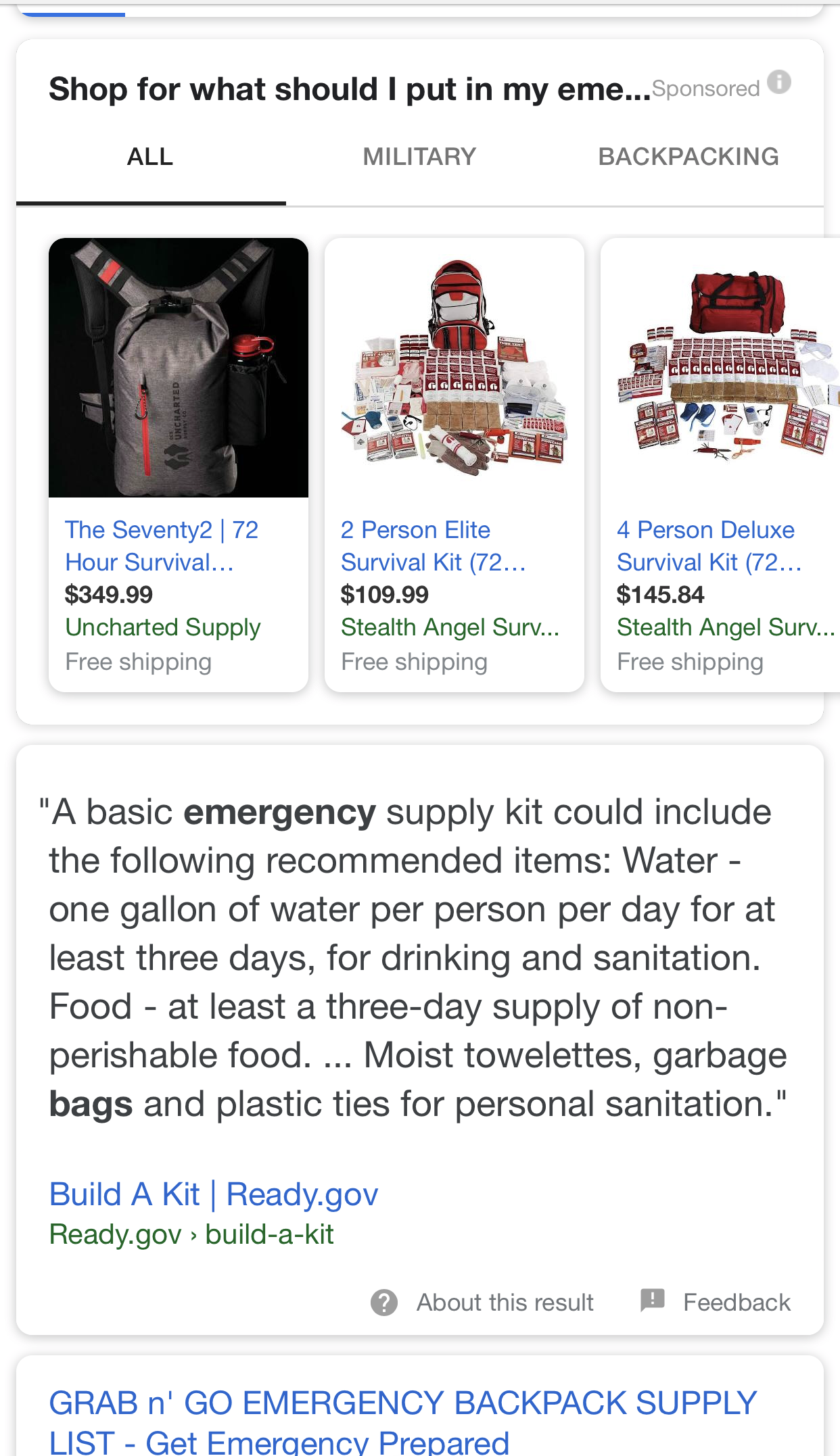
“What should I put in my survival kit?”
Again, Google Voice READS BACK the “Featured Snippet” result. And right above it, there are some ads to BUY a survival kit.
All of these examples hint at how voice search changes the way people will interact with technology in the future.
We’re moving towards a world in which voice will be “king.” Microsoft CEO Satya Nadella sums it up perfectly:
Human language is the UI layer.
This means that searching for content online will become more and more like having a CONVERSATION.
Basic voice search is just the first step.
We’ve mastered speech “recognition.” Yeah, transforming speech into search queries is cool and all…
But the BIG change is that these digital assistants are starting to actually UNDERSTAND what the words mean.
And they keep learning.
Google, for example, is using RankBrain to process search queries. This artificial intelligence program can recognize patterns in your search and then show search results that better match your intent. Or, if it’s a completely new query, take a calculated guess at what you’re looking for.
Often it will already automatically adjust your results based on things like…
- Time of day
- Weather
- Location
- Your preferences
- Your budget
And more.
These technologies are ALREADY powering voice search. And they’re only getting better. With every voice search, our digital assistant will get better at understanding what we really want.
For example, you might say “Show me pictures of Wales”… and get back pictures of Whales. You then use your voice to correct. “No, the country Wales” – and you’ll get the result you’re looking for.
In short: We’re moving from speech recognition… to understanding.
Think Star Trek. Or the movie Her:

The movie “Her”
We’re not quite there yet. But as Google, Microsoft, and Amazon are taking into account more and more CONTEXT of people’s search queries…
…search results will continue to get more accurate, actionable, and transactional (as we saw with the survival kit ads above).
Do you see the trend?
This is the big picture.
Now…
There are some specific ways in which voice searches are already different from typed searches.
What are they?
And what does this mean for you TODAY?
Let’s take a look at the 5 key differences that matter right now.
5 Important Differences of Voice Search You Should Know
As it turns out, there are some subtle but important differences between voice and text search. So let’s look at 5 key differences that you should be aware of.
Difference #1: Voice searches use NATURAL LANGUAGE
As it turns out, when we TALK to our devices, we don’t use “computer language.” We use human language.
I’ll explain.
Let’s say you want to know the store hours for your local mall. When they type, most people will type something like “mall hours” into the search field. But when they talk, most people will say something like “OK Google, what are the mall hours today?”
It’s weird. We actually talk to our devices. You’ve probably done this. I know I have… Whenever I use Siri on my phone, I say “Hey Siri, can you tell me when…”. I’ll even say please and thank you. Ha!
Let me give you some more examples:
Instead of typing “weather paris” we say…
“What’s the weather in Paris like?”
Instead of typing “Tom Brady age” we say…
“How old is Tom Brady?”
Instead of typing “next full moon” we say…
“When’s the next full moon?”
With voice search, we don’t use computer language.
We use human language.
In fact, Google reports that 70% of searches on Google Assistant use natural language.
So, with voice search you can expect more phrases and full sentences. Less single keywords searches.
This means that, in general, voice searches are longer than text searches.
This difference is starting to show in the numbers, too. Purna Virji shared some data from Cortana searches:
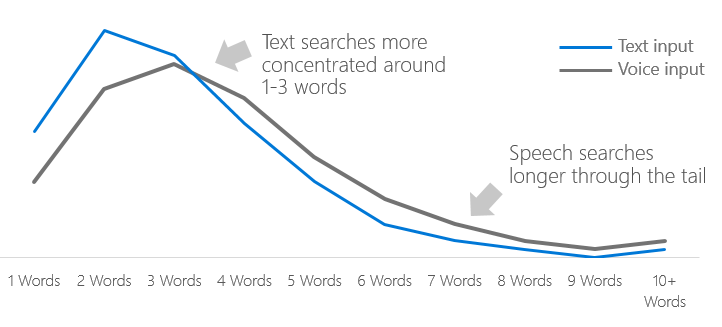
Voice searches tend to be longer
There are clearly more 3+ word searches from voice. This can be important for keyword targeting in SEO (more on how to optimize for voice search below).
Now, because voice search is so conversational…
Difference #2: Voice search uses more QUESTION WORDS
Just look at the examples queries above:
“Who?”, “what?”, “when?”, “where?”
Almost all of them use a question word.
This is in line with the trend towards more conversational search.
Users ask questions and expect answers. Well, actually, when they use voice search, they expect THE answer.
This is another important difference between voice and text search…
Difference #3: With voice search, there’s only ONE answer
Voice search is winner takes all.
You don’t get 10 answers back…
Ideally, your digital assistant will just read back the answer to you.
So, as voice search grows, people are less and less likely to scroll through search results.
The result of this? As Jim Yu points out, the best answer is usually the ONLY answer.
That’s why it will be more and more valuable to rank as a “Featured Snippet” in search results:

With voice search, there’s often only one answer.
Don’t worry – this is actually a great opportunity.
It might be tough to become the best and only answer for broad keywords. But for “long tail” keywords, you have the opportunity to claim that #1 spot (or Rank 0 as it is sometimes called):
Searches will get more and more specific (see difference #1 above). So there will be many more #1 spots that are up for grabs.
You might not be the “best web-designer”… but you might be the “best web-designer near San Diego with experience in designing membership sites” – or whatever the case may be.
Now, I already mentioned the next big difference…
Difference #4: Voice searches are more local-based
I already showed you the data on how voice, mobile, and local search go hand in hand. So, voice searches on mobile contain lots local queries like “near me” or “close by.”
Example query that I recently used – "Ok Google, show me nearby restaurants for dinner". 🙂
— Praveen Sharma (@i_praveensharma) December 7, 2017
According to the voice query app Hound, about 22% of voice searches fall into the “local” category. Things like restaurants, shopping hours, directions, local events, or traffic info.
This is obviously important for any business with a physical location.
For you, it means: The kind of information these local voice searches are looking for needs to be easily accessible.
Now…
There’s one more difference you need to know about.
Difference #5: Voice search is more action-based
Bryson Meunier mentions some fascinating Google data:
Voice searches are 30 times more likely to be “action queries” than typed searches.
Woah. But what’s an action query?
Action queries are things like…
- “Call mom”
- “Calculate my body mass index”
- “Buy milk”
- “Download the new version of Photoshop”
- “Rent this movie”
So basically, any time you want to do something other than just pull up information, it’s an action query. Google is already working on conversational shopping. And they want you to turn your content into actions for Google Assistant, too.
So, as content creators, we need to start taking this into account. Ask yourself: How can you turn your content into an Action?
Here’s an idea:
Let’s say you’re running a podcast. You want to help Google with voice searches like “Play the Social Triggers Insider episode with Tim Ferriss.”
These are the 5 most important differences that come with voice search. At least, as far as the experts can tell today.
They all fit into the big picture: With voice search, search is becoming more conversational.
Let’s talk about how all of this impacts you. And what you can do today to prepare for the changes that are still to come.
How Voice Search Impacts You: What Should You Do Today?
Are your content and ads showing up in voice searches? That’s what anyone with a website needs to think about.
You know now that the rise of voice search means…
- More natural language queries
- More question
- Winner-takes-all results
- More local searches
- More action searches
So what should you do, so that you don’t miss out? Let me suggest the following 5 steps.
Step 1: Make your content voice search friendly
Remember:
Voice search means search queries are getting more conversational. People are asking questions… and they’re looking for the best answer.
This is crucial because the question someone asks reveals a lot about their INTENT. The Moz blog recently shared a brilliant graphic to illustrate this:
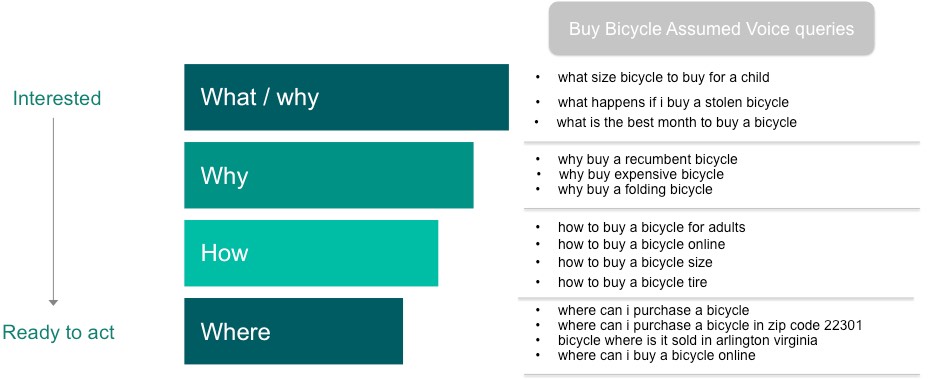
Voice search questions and intent
So, if someone’s asking “Where can I buy a bicycle online” they’re almost ready to buy. Not so much if they ask “What size bicycle to buy for a child.” They’re just gathering information.
Keep this in mind! Always think about the intent behind each question your prospects ask – and provide the appropriate content.
You can keep this simple by creating 3 categories:
- Questions with no purchase intent (“Who invented boxing as a sport?”)
- Questions that are research-based (“Is boxing good for strength training?”)
- Questions with high purchase intent (“Where can I sign-up for a boxing class near me?”)
If you’re running PPC campaigns you want to avoid questions with no purchase intent. So, add negative keywords to prevent your ad from showing.
Neil Patel recently shared this cool story of how a pool company pulled in over $2 million by answering questions like “How Much Does a Fiberglass Pool Cost?” on their blog. Not bad, huh?
But how do you know which questions people want you to answer? And how do you make your content more voice-search-friendly?
There some great tools to uncover question-based content ideas.
My favorite one at this point is Answer the Public. It’s a true goldmine for content ideas, based on actual search terms.
It’s super simple to use. Just enter your topic or search term. The site will give you lots of related questions, like this:

Answer the Public: boxing training
For “boxing training” I got questions like “What does boxing training consist of?” or “When to eat before boxing training.”
Or hey, you can just use the actual Google search bar…

Google autocomplete can help
…and the autocomplete function might spark some ideas, too.
Of course, you should just do proper customer research, too. You can also use my “What are you struggling with?” technique to uncover customer pains.
Start to create content for these types of questions. You’ll be one step ahead of the competition as voice search continues to grow.
What else can you do? The next step you can take is closely related to answering relevant questions…
Step 2: Target long-tail keywords
Voice search means that searches like “best wedding photographer” will disappear. Instead people will search for “Siri, show me a list of wedding photographers in Brooklyn for under $2,000”
So, instead of stuffing individual keywords into your content, you’ll want to target more long-tail keywords as voice-search grows.
Just to explain:
Long-tail keywords are searches that are highly specific. This means they’re usually longer (more words). They also have a lower search volume, aka they get less traffic. But because they are so specific, they’ll usually convert much better.
You can see – this goes hand in hand with creating more conversational content to answer any and all questions from your audience.
A great idea for this comes from Sherry Bonelli over at Search Engine Land: Sherry suggests you create conversational FAQ pages.
This is a smart way to target long-tail queries.
When you create FAQ pages, you can group related questions together. But only if it makes sense…
Because remember:
People want EXACT answers to SPECIFIC questions.
So, I’d recommend you create very specific FAQ pages. And of course, keep using natural, conversational language.
Sure, it will take some work. But these pages will help you in another major way, as you optimize for voice search…
This is a smart way to target long-tail queries.
When you create FAQ pages, you can group related questions together. But only if it makes sense…
Because remember:
People want EXACT answers to SPECIFIC questions.
So, I’d recommend you create very specific FAQ pages. And of course, keep using natural, conversational language.
Sure, it will take some work. But these pages will help you in another major way, as you optimize for voice search…
Step 3: Target featured snippets
Remember how with voice search there’s usually only ONE result?
Right…
That’s why it will be more and more important to get your content into that “Featured Snippet” spot.
Google will even read it back for people. “According to…” and name your site. That’s a pretty cool branding side-effect.
I already mentioned it above. The question is…
HOW?
Unfortunately, the answer is a bit more complicated. The first step is to get on the first page. And then help the search machine and AI understand the structure and context of your content. So I’ll cover that in the next two steps.
Step 4: Optimize for natural language
If you’re already ranking on the first page for certain search terms, you can optimize those pages and make them more voice search friendly.
Jennifer Slegg, founder and editor of The SEM Post, shared a great example in her SMX slides. Here’s how she optimized queries for the term “latte”:
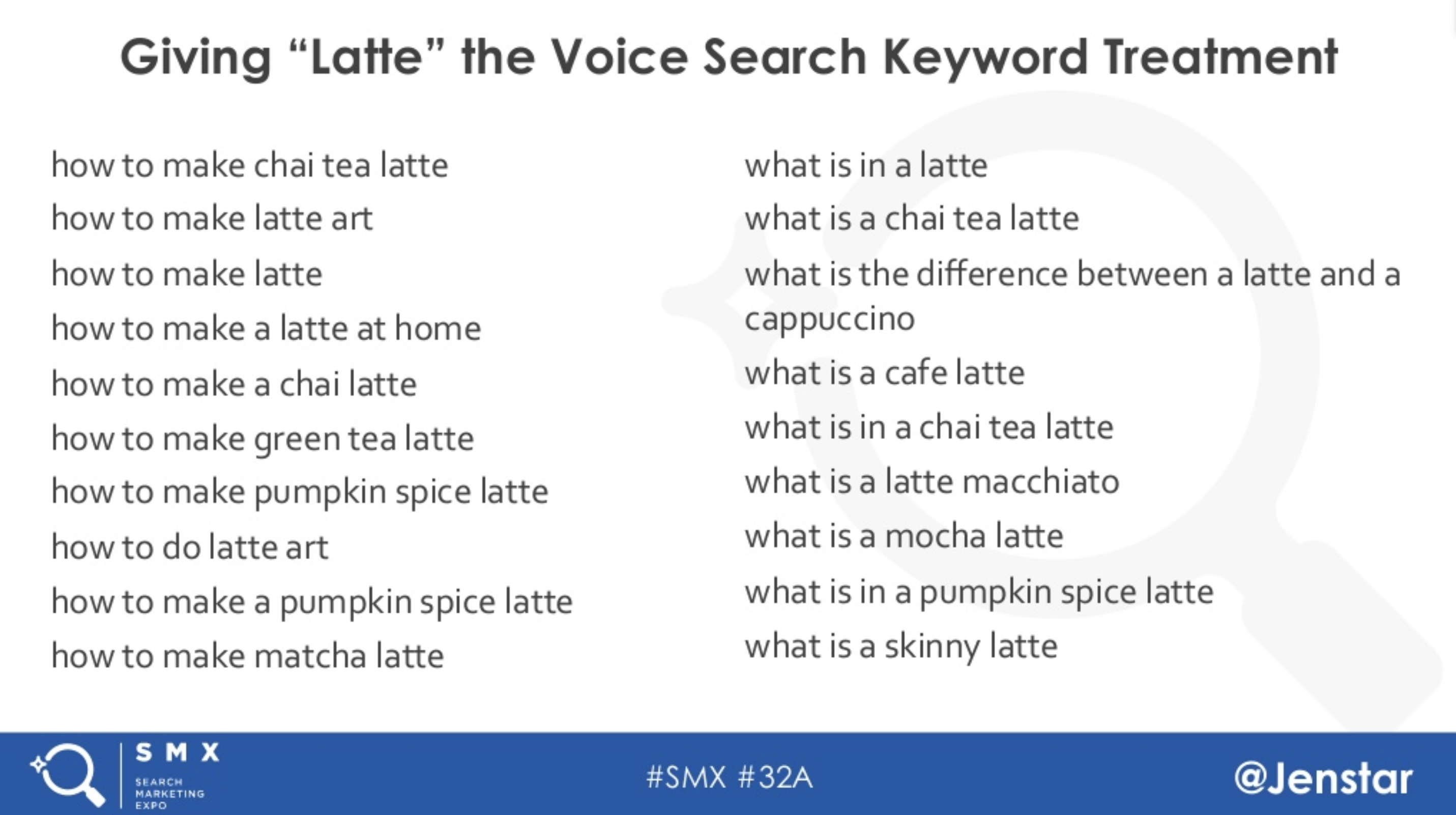
Keywords for voice search
Remember also to add more question words, because they are so much more common in voice searches.
When you do, Purna Virji says to make sure that you include all the “filler” words, too. Like this:
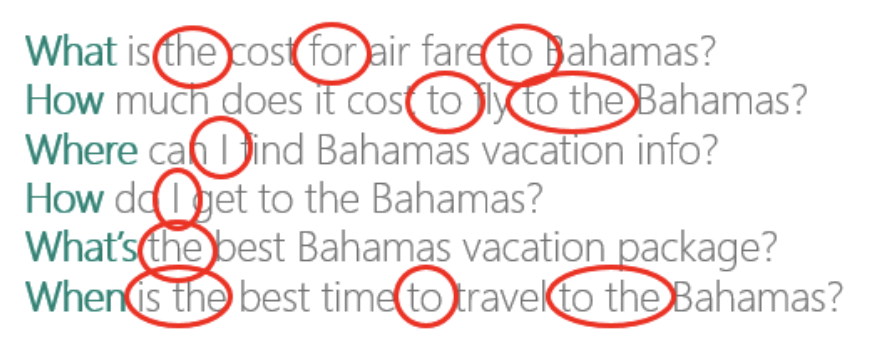
Voice search questions
The closer your keywords match the voice searches, the more likely your answer will show up as a featured snippet.
Finally, there’s one more technical thing you can do – across your site – to optimize for voice search…
Step 5: Help search engines understand your site with metadata and structured data
When you look at featured snippets, you’ll often see this:
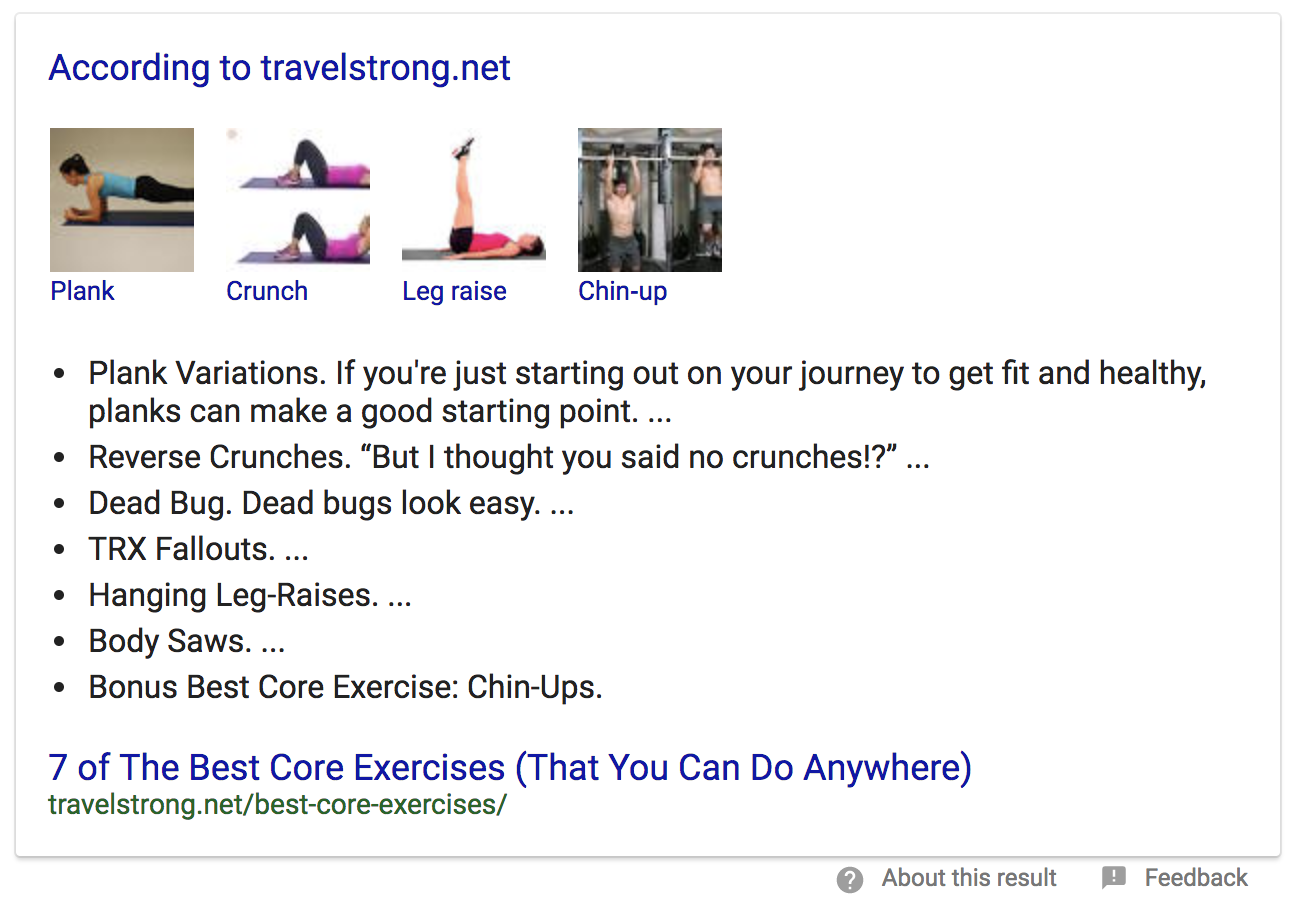
The benefit of well-structured content
Some kind of a structured list.
That’s because so many voice searches are “How to” questions. And people want quick answers. So, what they’re looking for are step-by-step instructions. They want an easy “recipe.” That’s what you should provide with your helpful content. Most importantly for voice search…
You should help search engines understand your content by adding metadata and structured data to your site.
This includes:
- Well structured content
- Logical headers
- Unordered lists
- Ordered lists
Plus, you need to start using proper schema markup.
If you’re scratching your head right now… Schema.org explains:
Most webmasters are familiar with HTML tags on their pages. Usually, HTML tags tell the browser how to display the information included in the tag. For example, <h1>Avatar</h1> tells the browser to display the text string “Avatar” in a heading 1 format. However, the HTML tag doesn’t give any information about what that text string means—”Avatar” could refer to the hugely successful 3D movie, or it could refer to a type of profile picture—and this can make it more difficult for search engines to intelligently display relevant content to a user.
Schema.org provides a collection of shared vocabularies webmasters can use to mark up their pages in ways that can be understood by the major search engines: Google, Microsoft, Yandex and Yahoo!
In short:
Schema markup adds a layer of meaning to your content, so search engines can understand it.
For example, if you mention your name in a blog post, you can add a tag to let search engines know you’re the author.
Or if you talk about the movie Avatar on your page, you can add a tag to the page that tell the search engine your page is about a movie. But of course, there are lots of different tags you can use, like people, places, movies, songs, offers, etc. It all depends on what your page is about.
If you’ve read this full guide, you’ll see how this is highly relevant for voice search…
It will help you rank in featured snippets. It will help digital assistants define actions (“Call XY restaurant”). And more.
To get started, Google has a useful Structured Data Markup Helper for this. First, it will help you mark up your content. Then it will generate the code for you, so you can add the tags to your site.
(If you need further instructions, you can learn more about structured data in this MOZ guide, too.)
One important note for local businesses:
Make sure your name, address, and phone (NAP) info is up-to-date and marked up. You might even want to include nearby landmarks and locations.
Why?
Remember that lots of people use voice search for local searches. Say someone searches “What are some good coffee shops near Central Park?” You’ll want to make sure the search engines know where you’re at!
The next step then is to also markup “actions.” That way people can call you to make a reservation, for example.
I know this is a bit technical. An easy first step is to claim your Google My Business information and keep your info up-to-date there.
PHEW!
I know I’ve covered a lot here. I don’t expect you to implement all the action steps at once. But now you have a full understanding of voice search. And you can optimize as you go.
Let’s recap the most important takeaways:
- Voice search is big and getting bigger.
- People are getting comfortable talking to their devices.
- Natural language is becoming the new user interface.
- As a result, long-tail keywords are becoming more important.
- This means you need to create more “conversational content.”
- Your content should answer specific questions with exact answers.
- You can help search engines understand the meaning of your content with structured data.
I’ll add or update this guide as major new info becomes available. In the meantime…
If this was helpful, please share it with someone you think needs to get up to speed on voice search.
Did I miss anything? Tell me how you’re preparing for voice search in the comments.








Yes, voice search not only changing the way searchers are interacting with the search engines but for the SEO’s and content marketers too as it enforces the SEO professionals to be more creative and targeted with the use of schema markup and long tail keywords. For content marketers, there is an opportunity to write the content in a conversational and natural way which also give you new innovative ideas to write and never looks boring to a reader. Overall, voice search is bringing positive changes for all of us.
Great post as always Derek,
The search engine world is constantly evolving day-by-day, with lots of new tricks and strategies being introduced to the market.
With the way things are going right now, I have no iota of doubt in me that Voice Search will take over sooner or later. I mean, It’s growing massively by the day, and It’ll be good if all of us start getting used to it, and setting up our blogs to adapt to the impending change.
Thanks for sharing,
Derek, this post alone is going down in history as the single most comprehensive, extensive and actionable piece on voice search to date: Metadata, snippets, schema markups and unordered lists…Thank you. Just thanks.
I am one of those people that has been talking about how big voice is going to be, and it is SO NICE to read such a structured “how to” article about it. Thanks for putting this together, I will be sharing it!
Awesome post, Derek, thanks for doing this! It may have been longer, but I found it completely readable and never felt bogged down.
You’ve got me thinking about “HOW can I lose weight on the rowing machine,” and “WHERE can I get certified to teach indoor rowing,” not just “lose weight rowing” “or “rowing certification,” which had been my default before.
Looking forward to seeing how this all evolves going forward.
And by the way, can I just say how refreshing it is to see a post about the importance of search and websites and NOT social media?
Thanks again!
Sarah
Sooo, I’m now on my second skim of this article ( definitely not the last, either). Here’s an observation for what it’s worth. Voice search doesn’t necessarily mean voice response, and this is where things might get hyper contextual. In other words, if you are talking to the microphone on your phone, the response that is “read” back to you is still a text response. If i’m not mistaken, you can still swipe down for more returns. If you are talking to Google Home or Alexa show/spot/dot, the response is 100% verbal. I haven’t completely tested this but my guess is with voice based hardware, this is where the idea of “first answer/only answer” becomes relevant. Oh…and then…..there’s an even more interesting topic about this. Language localization…sure, there’s the obvious joke about those two Scottish dudes in an elevator (lift ;-)) But when you get into bilingual/trilingual households this gets very interesting. Super insightful article and I’m glad you wrote about this.
Besides the fact that this is an incredibly informative and interesting article, I have to say… I can see this happening right before my eyes! I specifically use Siri (with a please and thank you) to find something local and get me directions. The most eye-opening part for me is the realisation that while I still mostly type in search, my 7 year old will grab my phone, open siri and ask a “natural language” question to get an answer! It’s exciting to watch this unravel and be ahead of the curve. Thanks Derek.
Fantastic summary. I especially like how you call attention to schema and localization metadata. I’d recommend anyone studying this further though also understand that this context is particularly key because people will often NOT say critical data elements the more naturally they use language. For example, someone might say “do I need an umbrella?” and only context clues lead to interpret that as a question about the weather versus a robotic match to say, a shopping list query.
Wow! I will be bookmarking this to use as a guide to improve my site for voice! How do you think voice search will change the podcast platform for content?
OMG Derek! This post was fantastic. I’ve noticed search results changing lately, but hadn’t even made the connection to how it could impact my local massage therapy business. I’m going to read this post at least a few more times, then I plan to start implementing everything you suggest step by step. I love the part about mentioning local landmarks. People sometimes search for us as the “massage place next to Whole Foods”, because our spa is in the same shopping center. I have that on our site in a few places, but I’m definitely going to mark it up.
Just read this whole article and all I have to say is wow. You knocked it out of the park with this one, Derek. There’s so much value in this that I’ll be referencing it for a long time while I start to optimize my content for voice. It’s obvious you put a lot of time, energy, thought, and research into this topic. I really appreciate you putting this post together for us. Keep up the great work.
Wow, thanks Derek, you’ve explained it really well. I’m not technical and can’t do SEO, but I can see how this makes sense already. My kids usually use voice search when they want to find something on Google – and they are the adults of the future! I don’t use voice search… I guess because I’m already set in my ways – I’m so 20th century! 😉 So I could add to my website, “Can I get a cartoon portrait for under £50?” Not a phrase I would have thought of adding. An FAQ page would be a great idea for me.
This is bloody brilliant. What great info! You’re right, I use Siri and Alexa almost on a daily basis and I talk in plain old ordinary every day English to them. I’ll definitely be using FAQ page now.
Thanks a lot Derek for answering some lingering questions I had about voice search and its impact on SEO (or do we need to call it Voice Search Optimization, why not?). In general Voice Search will let search engines like Google evolve more and more into an Aswer – Question tool. I think you’re absolutely right about the impact on Long Tails and natural writing. As SEO specialists we will need to add more and better content aiming at answering the questions of our target audience. I think that is a win-win for all. By the way, great to see you still adding real value to online marketing (I remember you talking during the Affiliate Summit 2011 in New York, also sharing great insights that materialized).
Great info – as always. Will definitely look to get in on this ASAP.
Will give me a good advantage when selling web services too!
You rock!
-Dennis